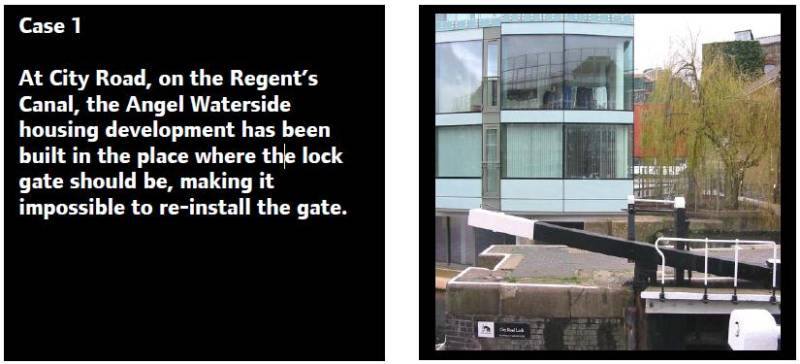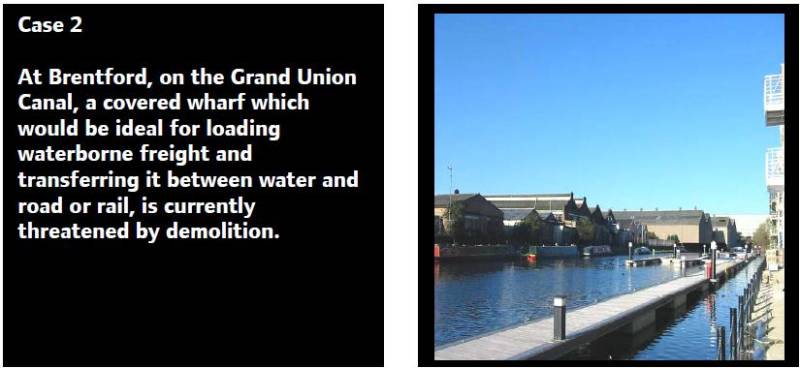
Deserted Highways |
|
| London’s waterways are a neglected and wasted
resource |
|
| A report by the Green Party Group on the London Assembly.
December 2004 |
 |
“London’s canals are a wasted resource. There is potential for moving millions of tonnes of freight by canal and reducing lorry traffic through London. But many parts of the canal network carry no freight traffic at all. This has to change. London’s canals must be put to work again.” Jenny Jones, Green Party Member of the London Assembly |
| This report outlines the current use of London’s
canals and identifies threats to their well-being. It calls for a major
transfer of freight from the capital’s roads to its canals. This
would lead to a dramatic reduction in lorry traffic, cleaner air, safer
streets and increased funding for the support and improvement of the
canal network, its towpaths and surroundings. |
|
 |
| London’s canals are managed by British Waterways,
for leisure, conservation and transport. The funding comes from
licensing and mooring fees, other earnings (for example for water
services, cabling under towpaths, a property portfolio and rental
income) and third party sources (such as planning gain and lottery
funding). Last year London’s canals received no direct funding
from the government. The government expects British Waterways to raise funds from its assets, including the development of canalside land. This development generates funds to invest in the canal network. But in some places the loss of canalside land to housing directly conflicts with the use of canals for freight transport and the use of adjacent land for operational purposes, such as wharves, warehouses, boatyards, waste management, recycling and reprocessing facilities. British Waterways has carried out many improvements to London canals in recent years. However funding is too little and too uncertain to pay for the major comprehensive overhaul which is now urgently needed if full use is to be made of the canal network for transport of heavy and bulky goods, especially waste and building materials, as well as for recreation and wildlife. |
 |
Here are some examples of the important roles which the
canals can play in London.
|
| London’s canal network remains hugely underused for
navigation. In some places the canals are empty waterways, silted up
and unattractive havens for old tyres. Some redevelopment schemes on
the canals will actually prevent the canal network being used fully for
transport and recreation. |
 |
 |
| “There are already many inspiring examples showing how London’s canals can be brought back to life. We must take this vision forward and make London’s whole canal network fully operational for transport, whilst protecting nature and leisure activity,” Darren Johnson, Green Party member of the London Assembly. |
Lack of a strategic advisory body for all London’s waterwaysThere is duplication and overlap between the Thames and Waterways Steering Group and the London Canals Committee, both of which are dormant, leaving an absence of strategic policy making and expert advice.Conflicting interests for British WaterwaysBritish Waterways is responsible for both promoting navigation on the canals and for raising funds for the canals from development of its property. These two roles can conflict and undermine opportunities to increase waterborne transport.FundingBritish Waterways’ funds are limited. Funds from other sources (e.g. the government’s Freight Facilities Grant and Transport for London) are too small and too uncertain to refit London’s canal network for modern navigation. Funds are needed to dredge to greater depth, automate and improve locks, and develop more wharves in the right place.Weak planning controlsThe Blue Ribbon Network policy in the London Plan is an important step forward in protecting London’s canals for water-based uses, but it still does not give sufficient priority to navigation on the waterways network. London faces huge development pressure and waterside sites are especially attractive for housing development. Even with the Blue Ribbon Network planning policy, wharves, warehouses, boatyards and waterspace are being lost to housing and other development.Lack of incentives and help to switch freight from road to canalTransport of freight by water is not promoted actively to potential customers. Advice and technical assistance is hard to obtain. Without financial incentives it is unlikely that many freight handlers will overcomes these barriers.Lack of integration with rest of London’s transport networkThe waterways network is managed by British Waterways without a formal connection to Transport for London. This makes it hard to plan for transfer of freight between water, road and rail, and the development of passenger services. |
 |
|
 |
Recent Publications by the Green Party Member of the London AssemblyFarmers Markets – Reconnecting Londons farmers and shoppersAllotments - Has London lost the plot? Bobbies on Bikes - Use of mountain bikes by the Metropolitan Police Keep off the Grass- The loss of London’s playing fields Plastic not Fantastic- Why plastic bags are bad Toilets going to Waste- London’s public toilets are being flushed away Chainstore Massacre - A recipe for revival of strong independent shops. Increase in Gun Crime – calling for a ban on sale of replica guns What a Pane – selling of illegal single pane replacement windows Traffic Free Parks – closing roads to motor traffic in parks Nuclear Free London – working for peace and security from nuclear hazards |
Contact InformationGeneral enquiriesTel 020 7983 4411 E-mail greenpartygroup@london.gov.uk Media enquiries Tel 020 7983 4424 or 07795 616812 London Assembly members Email: Darren.Johnson@London.gov.uk Tel: 020 7983 4406 Email: Jenny.Jones@london.gov.uk Tel: 020 7983 4358 Address London Assembly Green Party Members City Hall London SE1 2AA www.london.gov.uk |